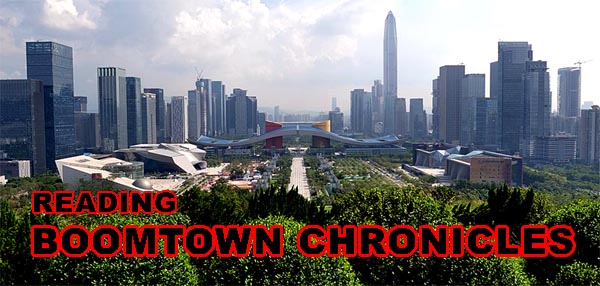 |
| Shenzhen, the Boomtown (Wikipedia) |
Note: Between Lesson #01-128 and #01-207, I wrote 72 lessons explaining expressions in articles published in the Shenzhen Daily. Read more about "Reading Boomtown Chronicles."
Get Ready: Have you ever had a cavity? What is it, exactly?
Boomtown Chronicles Part XVII - published Monday, October 13, 2008 (cont.)
- Title: "A forgotten cultural treasure trove."
culture: a slippery word to define. For us to describe culture is like a fish describing water: it's all around us, but we seldom notice it. Surprisingly, the word comes from a root that is better reflected in the related word "cultivate." Both of these words come from the Latin colere, which means "to till (the soil)," and by extension to tend or care for a place. Another distant relative is "colony," also descended from colere; a colony is a place that people establish and care for (often tilling the land as well).
treasure trove: any collection of valuable things. Originally, though, the phrase describes a treasure that was lost and then found again (from the French word for "find": trouvaille). So "treasure trove" is perfectly suited for the title of this article, as most of the relics discussed were lost and then found.
- There are several phrases using "cultural" in the article.
cultural desert: a place that lacks culture or cultural artifacts. A desert is a place where nothing (or very little) grows; the article proves that Shenzhen is not such a place at all.
cultural relics: the remains of (a) culture.
cultural sites: the places where cultural relics are usually found.
cultural heritage: what we inherit from the cultures of the past. "Heritage" is related to words like "inherit" and "heir."
- Some artifacts were found through "tip-offs" from local people.
tip offs: reports from people who have seen things. This noun comes from a phrasal verb (to tip off); it means to impart some private or secret information (a "tip").
- When an object or site is found, it may need to be "excavated."
excavated: dug up. The root here is cav- which looks like "cave." In fact, it means a hole (usually in the ground). So to ex-cav-ate is to take out (ex-) of a hole in the ground. We also see cav- meaning "hole" in words like "concave" and "cavity."
--------
Read more: https://en.wikipedia.org/wiki/Shenzhen
Practice: Choose the correct term to fill in the blank in the sentence below:
- cavity
- concave
- cultural desert
- cultural heritage
- cultural relics
- cultural sites
- culture
- excavated
- tip offs
- treasure trove
- The city built a museum to exhibit all the ________ the team found.
- People who didn't know the city well thought it was a ________, unaware of the riches to be found there.
- If you don't brush your teeth thoroughly you may end up with a ________.
- When I lived in Japan I didn't master the language, but I learned a lot about the ________.
- It took five years for the site to be thoroughly ________.
- Some telescopes use a combination of ________ and convex lenses.
- The police are always grateful for ________ about criminal activity.
- A commission was formed to protect the city's ________ in its many forms.
- The visitors were given a tour of the city's most splendid ________.
- Mark found a ________ of bargains on his shopping trip.
Answers are in the first comment below.
Submitted to the Shenzhen Daily for October 21, 2008


Answers to the Practice: 1. c; 2. f; 3. b; 4. h; 5. a; 6. i; 7. d; 8. e; 9. g; 10. j
ReplyDelete